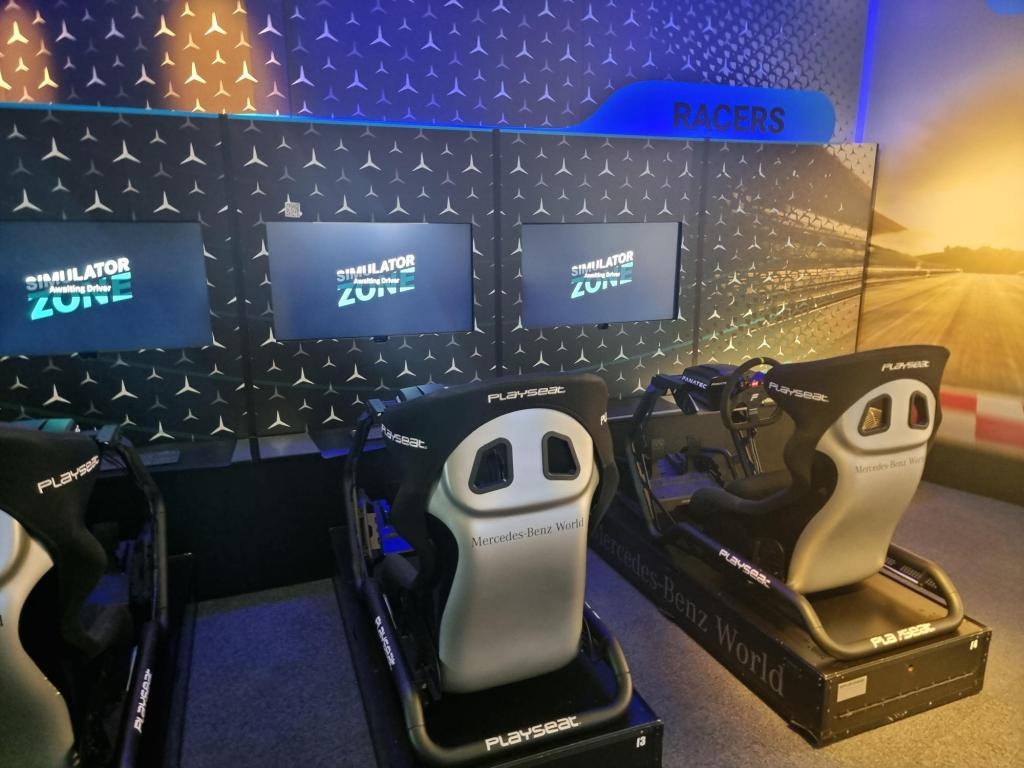
This week saw me taking a trip to Mercedes World to speak at the InTec IT Innovation in Education event in relation to esports and also to host a little esports round table. Now as usual my travels weren’t without their issues which started from the outset with the car park at the station being full, so no spaces, and then was promptly followed by a delayed train meaning I missed my connection. I do sometimes wonder why I continue getting the train however I suspect, if I drove instead, there would just be significant traffic jams plus I wouldn’t be able to work or have a beer in the process of travelling. As it was the already long journey took just over 5 hours to complete.
So as to the event itself. The first topic covered was AI in education and in particular Microsoft’s Co-Pilot. Now this session focussed on the paid version of Co-Pilot where it exists in Word, PowerPoint, Outlook, etc, rather than the free version. The capabilities are impressive as was evidenced by the demo video which was worked through however two challenges currently exist in schools. One is that of cost, with a cost of around £25 per user per month the scalability of CoPilot in its paid form across whole school staff bodies is rather limited. That said it could be issued to key users. The other issue is that of data protection and data security in relation to how CoPilot may surface data which it shouldn’t but where permissions and labelling of data has been historically poor. Now an example I used here, and experienced recently albeit not actually involving copilot, involved a poorly configured MS Team with data pertaining to a trip. Permissions made the team available to all within the organisation, including students. Now in the past this wouldn’t have been a problem as students would either need to find the link or get very lucky in stumbling across the Team however in this case the AI in office 365 which tries to predict what might be useful, surfaced some files from this team following a number of staff accessing said files. Office 365 was just presenting “this file might be of interest” however surfaced information which wasn’t meant to be available to students. In a world of CoPilot this is likely to happen all the more often and present significant potential risk.
Next up was a discussion on cyber security and safeguarding. I liked the strong linking here between safeguarding, which is rightly viewed as critical, and cyber security, which is often shown lesser consideration. It may be that the best way forward in terms of schools and cyber security is to view it as an aspect of safeguarding in keeping student and staff data safe and secure, and through this protecting them from potential harms. And isn’t protecting student from harm exactly what safeguarding is about?
During the lunch break I got my hands on a very nice Sim racing rig and got to do a bit of racing. To start with I didn’t do too well, treating the pedals like an Xbox controller, with a brake and accelerator pedal with an up and down position and nothing else. Cue, spinning off the course and missing corners. I joked with one of the Mercedes staff that I was driving a lawnmower given the amount of time I was spending on the grass. Later I started to get a better feel for things and for being more careful with my acceleration and braking, at which point I started to make gradual improvements, eventually getting my lap time down below 1 minute and eventually coming 5th on the leader board.

After lunch there were sessions on infrastructure and IT planning. I think the key messages were the importance of a modern infrastructure to support the increasing number and differing types of devices, including VR headsets and 3D printers among many other items. Also, the need to plan and plan early. This always makes me think of failing to plan as planning to fail, however in this case its not just about planning but about planning early to allow time for those things we cant predict.
My session was largely on esports, talking about how easy it is for schools to get involved with esports plus about the potential benefits in terms of soft skills development but also in terms of the potential career pathways which esports, and the soft skills it helps develop, might open for our students. I still sense that esports continues to be adopted more by the Further Education colleges than it does within schools, and I feel this continues to be a shame as the benefits are not limited to those 16+ year old.
My session also had a second topic being the ISBA Technology Survey. Now I led on the development of the 2024 survey and resultant report, picking up from the work of Alan Hodgin and Ian Philips who developed the 2018 survey. I continue to feel that technology changes so fast that no school or staff in a single school can effectively adapt and therefore we need to seek collective solutions. To that end the ISBA Technology survey is about gathering data and presenting baseline information to schools on how technology is being used across schools, to help in comparison and in planning.
Conclusion
The event was very enjoyable and the Mercedes World venue was perfect, especially given the opportunity to get some Sim racing done before then presenting on esports. It was also a great opportunity, like so many other similar events, to network and share thoughts and ideas, including getting to catch up with a few colleagues from other schools where I haven’t seen them in person for a number of years now.
AI does continue to be a common topic in education circles at the moment, and this event was no different, however I am increasingly seeing discussions of esports; This is something I find very heartening and something which I hope continues. It would be great to see more and more schools get involved in esports, helping students develop the soft skills which esports support, plus introducing them to the many career paths which esports links to.

